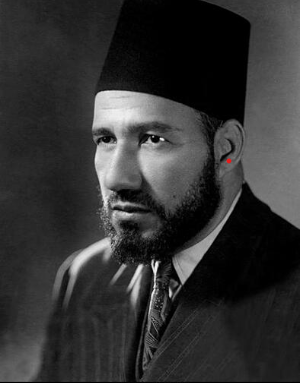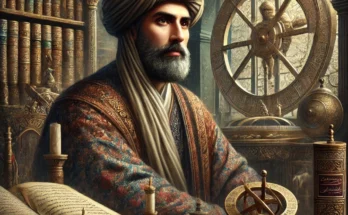Early Life and Education.
Hassan al-Banna was born on October 14, 1906, in the small Egyptian town of Mahmudiyya, near Alexandria, to an unpretentious and devout Muslim family. His father, Sheikh Ahmad al-Banna, was a local imam and watch repairman. He had studied Islamic jurisprudence and was steadily engaged in Islamic scholarship. Sheikh Ahmad significantly influenced young Hassan, imparting to him a sense of Islamic identity and a love for religious studies. Thus, this religious upbringing together with an awareness of British colonialism in Egypt only created a temporary full-blown devotion towards Islam and a growing affliction for the state of society at large in al-Banna.
Beginning in childhood, al-Banna developed an unwavering interest in Islam as well as an irresistible inclination toward religious and social reform. He was educated in local Quranic schools, and eventually a government primary school, where he became acquainted with religious activism. Then the outsider imperial student became an active member of many an Islamic youth group and organization resisting colonial influence and fostering Islamic morals. Al-Banna’s early activism found particularly strong support in the spiritual vision associated with Sufism which was a focal point with regard to al-Preaching Banna’s early life and education. This internalized experience that matured a preparedness towards outliving oneself to form a productive society shaped al-Banna’s understanding of Islam as a complete assemblage of beliefs, morality, and practice to condition a global integration of life in the individual and social sphere.
Higher Education and the Seeds of Activism.
In 1923, when the young al-Banna turned just 17, he moved to Cairo, where he would study at the Dar al-Ulum, a teacher-training institution focusing on Islamic and modern sciences. Cairo, along the way, being the heart of Egypt itself and the cradle of influences of intellectual and political movements, opened al-Banna to an entire world of ideology and idea. Cairo was bowed down by bursts of nationalist sentiments spurred by fervent opposition to British colonial rule there and had an emerging secular elite looking towards the West to model their senses of progress and modernity.
To his dismay, al-Banna found Islamic values diminishing within Egyptian society. He blamed cultural and moral decadence-a concept drenched in a Western ambiance for interfering with the traditional Islamic values that had been a uniting and hence strengthening force for Muslim societies, throwing them into disarray. He performed excellently at Dar al-Ulum, engaging in debates on how Islam should respond to the needs of contemporary reality. He had come to the conviction that Islam was a whole way of life with ramifications beyond just the behavior of the individual. He believed that Islam should guide not only individual behavior but also social and eventually, political systems.
At the same time, his attention was increasingly drawn towards the fragmentation of the Muslim world and the weakening of Islamic influence upon public life. He believed there was a way out through the revitalization of Islamic principles and teachings. His Cairo experience would mold him into a man more inspired than ever to create a movement that would awaken the Muslim community or Ummah towards Islamic unity, education, and self-determination. This was to become a visional foundation for the work of his life.
Founding of the Muslim Brotherhood Hassan al-Banna
By 1928, five years after he graduated from Dar al-Ulum and began teaching in Ismailia, al-Banna was one of the seven founders of Ikhwan al-Muslimin, or Muslim Brotherhood (al-Ikhwan). Beginning as a small religious and social movement aimed at urging Egyptian Muslims to return to their religious roots, al-Banna conceived the fraternity along the lines of giving Islam guidance on all human life aspects: social, economic, and political. He believed that the method to revitalize Egyptian society and eventually the Muslim world lay within religious education, social activism, and apposite engagement with issues of social concern.
The Brotherhood’s goals constituted al-Banna’s belief in al-Islam huwa al-hall “Islam is the solution.” He saw the need for the country to return to full, original Islamic principles as the only way of addressing its moral, political, and economic problems. While the focus remained on religious education, literacy promotion, schools, and social work in its early years, soon its message started booming with a wider audience, especially among the disillusioned urban poor and students, as well as workers let down by the present political order and the widespread poverty under British colonial influence.
The Brotherhood expanded as it developed a more formal structure and undertook a wider array of activities. By the late 1930s, it had matured into an important social and political force: it was a movement against colonialism, demanding the application of Islamic principles in government and the unification of the Muslim world behind those principles. Al-Banna expounded that Islam consisted not just of belief but of a man-made system to solve all his problems–government, education, and even social welfare. A little-discussed theme in his earlier writings was that of non-violence and gradual reformation, although he believed very firmly in the necessity of having a whole non-violent cadre to lead the way in fulfilling the Brotherhood’s objectives.
Expansion and Political Influence Hassan al-Banna
Through al-Banna’s leadership, the Muslim Brotherhood underwent rapid transformation in the thirties and forties from a small local association into a mass movement with branches across Egypt and, later, other Arab countries. The organization’s goal was to bring Islamic principles into daily use and to provide services that the Egyptian government has long neglected. Its network of social services brought the Brotherhood into people’s hearts, especially in poor urban areas where the welfare programs of the organization provided vital support to those in need.
Al-Banna envisioned the Muslim Brotherhood as the renewal of pan-Islamism that can unify Muslims all over the world under one roof, the roof of Islam. With expansion came a membership drawn from the entire Arab world, and The Muslim Brotherhood saw a rapid expansion which enabled the establishment of branches in the following countries: Syria, Jordan, and Sudan. This development reflected a growth of influence for the brotherhood within regional politics becoming one of the key players of the budding Islamist movement.
During this period, al-Banna also began to articulate a somewhat clearer political agenda. He maintained that Islam was political by its very nature and that it was essential for Islam to be the guide for the establishment of a just and moral society. He advocated the expulsion of British colonial rule in Egypt and the waxing of an Islamic state under Sharia Law. Al-Banna did initially set out demands in favor of non-violent changes, but socio-political transformations within Egypt at that time pressed the Brotherhood into a more confrontational disposition towards both Britain and the Egyptian government.
World War II and the Shift to Political Activism
World War II thus, ushered in new prospects and challenges for the organization. Economic disarray and political instability gave birth to disenchantment towards the regime that had existed in Egypt right before the war. Al-Banna seized this opportunity to expand the Brotherhood’s influence by mobilizing followers and calling for social and political reforms. During this time, the message of the Brotherhood resonated with an increasingly disillusioned number of Egyptians in their dissatisfaction with both the ruling elite and British colonial authorities.
In the late 1940s, the biggest escalation of the Brotherhood’s political activism took place. Al-Banna swiftly after openly criticized the Egyptian monarchy and too close ties of the government with Britain, something he sought to change with a government based on Islamic principles. The organization was also opposed to the creation of Israel; it sent volunteers to fight alongside Palestinian forces in what was called the 1948 Arab-Israeli War. This connection to the Palestinian cause elevated al-Banna’s stature with his supporters and further gained international attention for the Brotherhood.
However, this political activism of the Brotherhood further entrenched the tensions between them and the Egyptian government. The Egyptian government officially dissolved the organization in 1948, along with the arrests of a considerable number of its members; this was due to fears of the growing influence of the Brotherhood, threatening in return the throne. This political scene began to become more hostile, and with that indication, al-Banna’s relationship with the authorities descended rapidly. Indeed, in spite of his plea for peaceful reform, repression returned, and different factions in the organization began arguing for radical means.
The Assassination of Hassan al Banna and Its Legacy Hassan al-Banna
Shaikh Hassan al-Banna left this world in tragedy and turmoil as a result of his assassination in Cairo on February 12, 1949, allegedly by government agents. His assassination followed a wave of arrests and crackdowns on the Brotherhood, a reflection of the Egyptian state’s will to rid itself of the organization. Al-Banna’s death was a great shock to his followers; he became a martyr and so was enshrined in memory as a figure with deep respect among Islamists.
Al-Banna’s short life would however give rise to such a profound influence that would shape the development of political Islam throughout the 20th and 21st centuries. The platform founded by him was in the pursuit of modern Islamist thought, calling for the establishment of the Islamic state, and looking to respond to the challenges brought by colonialism, secularism, and modernization while under al-Banna’s leadership. His writings and speeches continued to inspire Islamic movements around the world, and the Muslim Brotherhood did, and continues to exist, as a major force in politics in the Middle East.
It is the dream of Al-Banna to have a society guided by Islamic principles, and this vision will have far-reaching and indelible marks. Many regard him as the reformer who fought to return Islamic values and social justice. What speaks for most, however, is the political desire of Al-Banna and the eventual involvement in an armed struggle by the Brotherhood, which makes him a controversial figure. His thought was influential in everything from peaceful political activism to radical ideologies among the spectrum of Islamic movements attribute which showed his legacy engaged and continuous in development.



